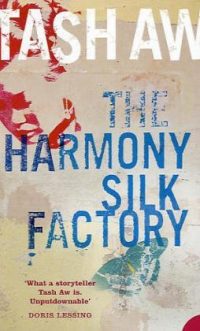A brief rain shower, sweeping swiftly across the valley, gently moistening the parched leaves
 The Harmony Silk Factory
The Harmony Silk Factory
by Tash Aw
This novel seemed to have all the right elements for me to love it, but I’m not sure I even liked it. I see a lot of Goodreads reviewers have called it 2/3 a good novel and I can see their point, but I think it fails long before the final section that others disliked.
Set in Malaysia, with its key events taking place in the 1940s, this is ostensibly the story of Jonny Lim, a poor country boy turned wealthy textile merchant, but his story is told through the lens of three narrators who all think they knew him far better than their accounts suggest is true. Was Jonny a Communist leader, a gangster, a murderer, a traitor? His son Jasper thinks so, but his account appears to be the least reliable of all.
Jasper is the first narrator. Following his father’s death, he is trying to piece together Jonny’s life from a combination of official documents, his own memories, rumours and a generous dose of his own imagination. His unreliability is so thickly laid on that I found it tedious rather than mysterious. There is some satisfaction to be had from seeing some of the events later through another perspective and finding a version of the truth that rings truer, but a lot of what Jasper covers is never revisited, so it can only ever be pure speculation.
While Jasper was raised by his father, and should therefore know him better than the other two narrators, the key events he is trying to unravel all happened before his birth. Jasper’s mother Snow died in childbirth, so he endows her with angelic qualities that may or may not be warranted. In addition, the events in question are of necessity shrouded in secrecy because they involve the Japanese occupation of the Malay peninsula, and whether Jonny was working for guerilla Communists or for the Japanese or perhaps both. Couple that with the fact that he had an antagonistic relationship with his father later in life, and it becomes clear that Jasper is determined to think the worst rather than having any real evidence of anything at all.
“The day TK came to the shop, it rained heavily and unexpectedly. It was mid-August and the dry season was at its peak, shrinking the rivers into cracked brown beds and rotting the overripe mangoes and jackfruit which lay blackening on the ground. At this time of year the people of the valley shut themselves indoors in the afternoons. They fan themselves with rolled-up newspapers and wait for the odd breeze to stir the heavy air. Occasionally, even at the driest times of the year, there may be a brief rain shower, sweeping swiftly across the valley, gently moistening the parched leaves of the trees. Barely an hour after it passes the earth is dry again and does not smell of water.”
I was so annoyed by Jasper’s tone and what seems to be wilful misunderstanding that I was ready to give up on this novel. But a quick browse of other reviews mentioned that there were three narrators, including Snow, so I decided to hold on and see if her voice saved the novel. It did. I only wish the whole thing had been as good as that middle section.
The middle section is an excerpt from Snow’s diary, a year after her marriage to Jonny. Her parents contrive to send her and Jonny on a belated honeymoon to a mysterious island, accompanied by a trio of escorts: a suave Japanese professor, an aloof English gentleman liked by no-one and Jonny’s closest friend Peter, another Englishman who is awkward in every situation except when he’s alone with Jonny.
Clearly Snow’s parents are up to something but she appears to accept it without question. Is she naive, or is she not telling the whole truth in her diary? There are a multitude of lies and resentments at play between the four men and it seems unlikely that Snow could be ignorant of the reasons. But I did enjoy her voice and her descriptions of the rather strange journey the five of them undertake.
The final section is narrated by Peter, grown old and living in a retirement home. In-between his plans to revamp the garden, he reflects on his friendship with Jonny and why it ended. He’s still living in Malaysia and is clearly not well liked at the home. It’s easy to see why, as his language is pretentious and racist. He’s an awful person but he does appear to illuminate some of the mysteries raised earlier in the novel, or at least confirm or deny things heavily hinted at. Then again, why should we trust that is more of a truthteller than Jasper or Snow?
I understand the theoretical appeal of a story full of questions that aren’t really answered, the historical backdrop is interesting and the descriptions of the Malay countryside are beautiful, but this just didn’t work for me. The one woman character appears to be nothing more than beautiful and stupid. The men reveal too little about themselves to ameliorate their negative qualities. And I guess I prefer mysteries that are solved.
Published 2005 by Fourth Estate.
Source: Secondhand, probably from a charity shop years ago.